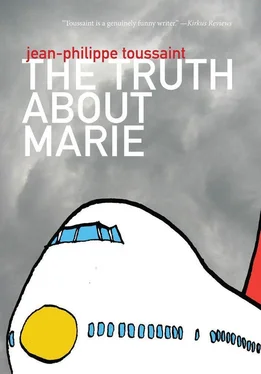Marie heard an ambulance’s siren far off in the distance, she ran to the window, her bare feet splashing through a tiny pool of rain that had formed on the floor. Marie, naked, leaning out the window, braving the wind and rain, tried to spot the ambulance coming up rue Croix-des-Petits-Champs, then discerned in the distance the first flashes of the ambulance’s lights accompanied by the growing sound of its siren, and then there wasn’t one but two emergency vehicles bolting through the night and surging onto rue de la Vrillière with their blue and white lights spinning and flashing in the falling rain, a large white ambulance and another medical vehicle that drove onto the sidewalk and parked at the building’s entrance. Two figures got out of the latter, while the paramedics from the former slammed their doors and ran out into the rain, ducking their heads in the downpour, carrying all sorts of medical bags and backpacks. The whole group ran on the sidewalk, hustling to get into the apartment, but they remained stuck down below, their rush brought to an abrupt halt, the front door remained jammed in spite of their repeated attempts to jar it open and force their way in. One of the crewmembers turned back around, backed all the way to the street, and looked up at the building. His face whipped by the rain, he finally spotted Marie at the window and yelled to her that the door was locked. Marie gave him the entry code immediately, but got confused, gave him the old one, she didn’t remember, gave the new one, shouted it several times between her cupped hands, and ran down the hall to open the apartment door. She stepped out onto the landing and heard the door buzz and open below, hurried footsteps already resounded in the entryway, and she heard the long strides of the paramedics bounding up the stairs and almost instantly they appeared before her in the darkness. Without so much as uttering a word they entered the apartment. The blue glow of her laptop in sleep mode provided the only light. There were five crewmembers, four men and one woman. They charged down the hallway determinedly and, wasting no time, headed into the bedroom without asking their way, as though they knew exactly where it was, as though they’d always known where the room was located, and, before anything else, before even glancing at the body asprawl on the ground, before examining it or even paying it the least attention, they went to adjust the light in the room, in which there was no ceiling light but rather a multitude of small lamps Marie had collected over the course of many years, the Tizio from Richard Sapper, the chrome-headed Artemide Tolomeo, the Titania from Alberto Meda and Paolo Rizzatto, the Itty Bitty from Outlook Zelco, all of which the paramedics turned on at once, the five paramedics heading to the four corners of the room to turn on all the lamps at once — and it wasn’t until then that, standing among the paramedics in the middle of the room, Marie realized that, with the room’s light at its full brightness, she was completely naked.
With the same determination, characterized less by speed than by precision, scrupulousness, and an impressive economy of gesture, the paramedics undressed Jean-Christophe de G. directly on the floor, they lifted him to remove his coat and undo his shirt, opening it at the collar, causing buttons to fly off as they pulled on either side of the shirt, stripping him in this way to uncover his chest, while the doctor had already begun to check his heartbeat with a stethoscope. One paramedic, crouching beside the patient, took his pulse, then strapped a blood-pressure cuff around his arm and squeezed the inflation bulb, noting that the pressure was very weak, hardly perceptible, virtually nonexistent, as was his carotid pulse. He needed to be put on a ventilator immediately, and they placed a transparent mask over his mouth and nose, carefully controlling its airflow by means of an oxygen pump. Another paramedic, kneeling on the ground, had opened a medical kit at the foot of the bed, next to where the small glasses of grappa had been left, and was preparing to give him an IV. He’d lifted Jean-Christophe de G.’s inert arm in order to disinfect the skin around his wrist with alcohol, then, wasting no time, he located a suitable vein solely by the touch of his hand, tightened up the tourniquet he’d tied, removed the lid of the needle, and stuck the point in at an angle. Then, with the sound of ripping tape, he opened the bandage and placed it over the IV on Jean-Christophe de G.’s arm to hold it in place for the moment. There were medical kits and cases strewn about the room, opened and spilling over with syringes, rubber tubes, and accessories vacuum-sealed in clear plastic bags. Kneeling on the hardwood floor, the doctor began lathering Jean-Christophe de G.’s chest with a translucent and slimy gel, applying and spreading it like butter with both hands to soften and desensitize his skin, and, having taken a disposable razor out of its plastic case, small, blue, rudimentary, a mean little disposable razor whose toothpick handle offered little purchase, he began shaving his chest rapidly, in great even strips, from top to bottom, perfunctorily as a daily habit, with little care, scraping his skin, clearing a space rather than really shaving, effecting a slow movement in the end, a sort of exaggerated comma in the crux of the sternum, then flicking the blade to remove its foamy glop of gel and tiny hairs before quickly placing a network of electrodes on the reddened, irritated skin. There lay Jean-Christophe de G.’s body in the middle of the room, surrounded by a shifting mass of white figures hardly distinct from one another, the blinding light of a 400-watt halogen lamp shining on his chest, which a paramedic had run out to get to increase the light in the room — but, even with the combined effort of all Marie’s designer lamps turned on together, the room was no brighter than a boudoir. Standing in the room, dressed in a short-sleeved tunic, the paramedic held the lamp by its base over the inanimate body, its adjustable head fully twisted to shine on Jean-Christophe de G.’s ghostly white, electrode-covered chest. The room had now taken on the look of a surgical unit.
Marie had gone into the bathroom to throw on a T-shirt, and she was now pacing the room, confined to the extremely small space unoccupied by the paramedics. She didn’t know what to do, where to stand, she’d gone over to the window and closed the shutters to keep the rain from coming into the room. She’d given up asking the paramedics questions, it was pointless, the gravity of Jean-Christophe de G.’s state needed no explanation. Besides, the paramedics, in a circle around the body, didn’t pay her the least attention, they were studying the electrocardiogram reader, the tiny bright screen of a cardiac monitor built into a medical case that lay open at the patient’s side, and from time to time they exchanged a few words in a whisper, one of them getting up on occasion to carry out a specific task, fetching a missing instrument or delivering an injection with the IV. Marie witnessed then an abnormal haste among the group, a spreading tension among the paramedics that caused a sudden acceleration in the performance of their tasks, with a nervous shuffling to and fro and a tangle of hands at work above the inanimate torso, a telling indication that Jean-Christophe de G.’s condition had taken an abrupt turn for the worse. The doctor, in a act of extreme urgency, sat up to press down on the patient’s sternum, before hastily placing two great electric paddles connected by means of cables to a defibrillator on Jean-Christophe de G.’s electrode-covered chest, one paddle on the upper part of the chest and the other between the ribs. Wasting no time, the doctor asked the paramedics to stand clear and, assuring that no one was in contact with Jean-Christophe de G.’s body, proceeded to perform a ventricular defibrillation by delivering a brutal electric shock, causing the patient’s chest to shake on the floor, from top to bottom, while the electric charge went through to the myocardium. Then, falling back onto the floor, the body lay motionless, and Marie understood then that Jean-Christophe de G.’s heart had stopped beating. Marie approached the paramedics and looked down at the stripped body, its face hidden by the oxygen mask, its white inanimate flesh dotted with electrodes, skin like a fish, cod or flounder, and Marie couldn’t help thinking that it was this same motionless body that she’d held in this room less than an hour earlier in that very spot, this body stripped naked and dispossessed, objectified by a whole array of medical apparatuses, shaved, hooked to an IV and ventilator — this body reduced to its bare substance, bearing no sign of Jean-Christophe de G’s personality. She realized then that up until this moment she hadn’t really looked at his body, not once throughout the whole night, not even while making love had she taken an interest in his body, she’d hardly even touched it, hadn’t paid it the least attention, being concerned as she always was with her own body alone, caring only for her own pleasure.
Читать дальше












